Assessment of CSR Impact on Employee Work Life at Hilton Hotel
VerifiedAdded on 2021/02/20
|23
|7411
|34
Report
AI Summary
This report examines the impact of Corporate Social Responsibility (CSR) on employee work life, specifically focusing on the Hilton Hotel. The report is structured into two assessment tasks. Assessment Task 1 introduces CSR, its impact on organizations, and the methodologies used, including primary and secondary research. It analyzes how CSR initiatives, such as health and safety insurance and training programs, affect employees' work culture and well-being. The task also reviews the impact of CSR on organizations, including customer retention, funding access, and overall stability. Assessment Task 2 outlines a project investigating the impact of CSR on employees' work life within the hospitality industry, using Hilton Hotel as a case study. It details the project's title, summary, participant selection, recruitment methods, risk mitigation, and data collection and analysis. The research employs qualitative analysis through questionnaires to gather data from 30 Hilton Hotel employees in the UK. Ethical considerations, including confidentiality and honesty, are emphasized throughout the research process. The report concludes by highlighting the need for further empirical studies to improve overall organizational and employee performance through CSR practices.
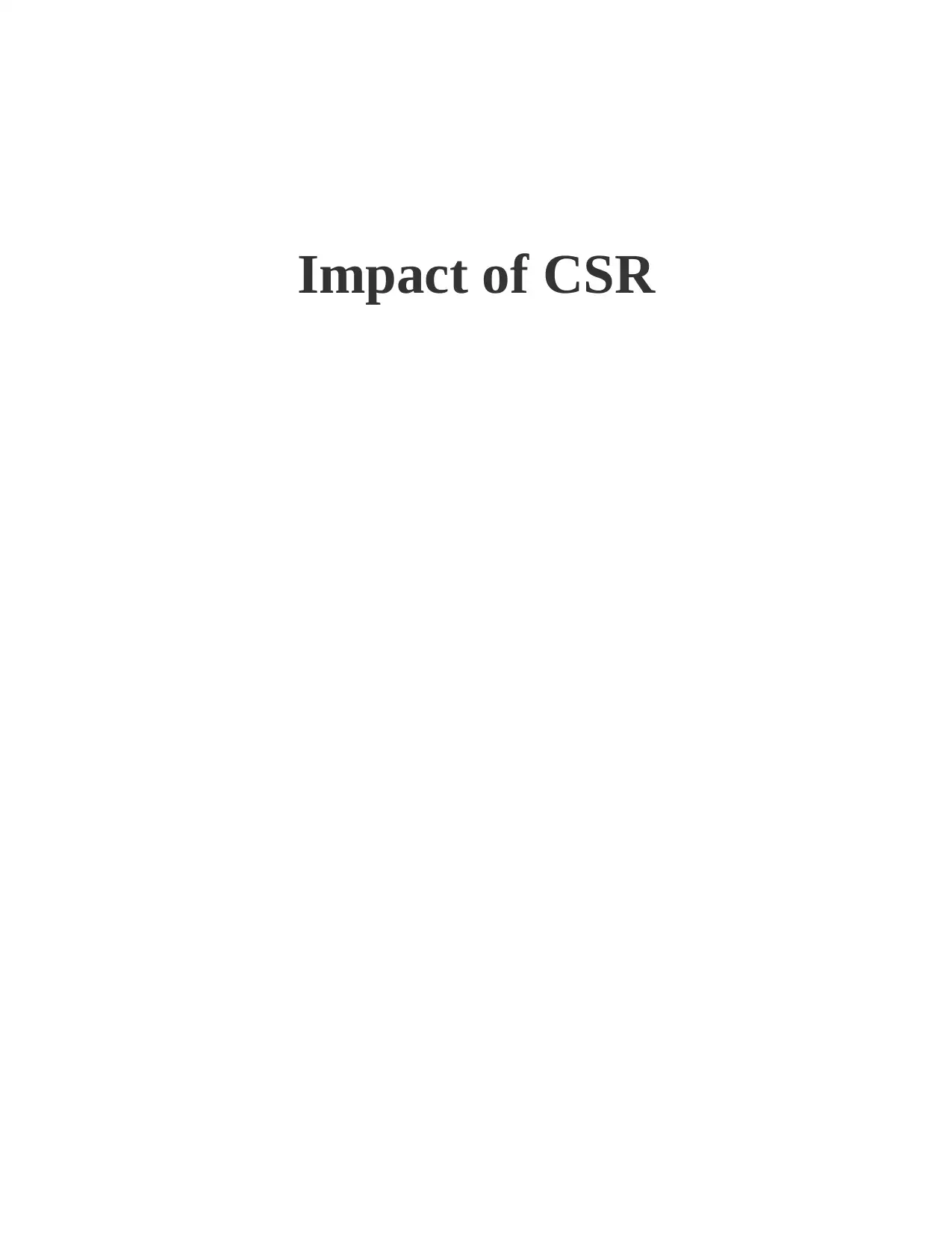
Impact of CSR
Paraphrase This Document
Need a fresh take? Get an instant paraphrase of this document with our AI Paraphraser
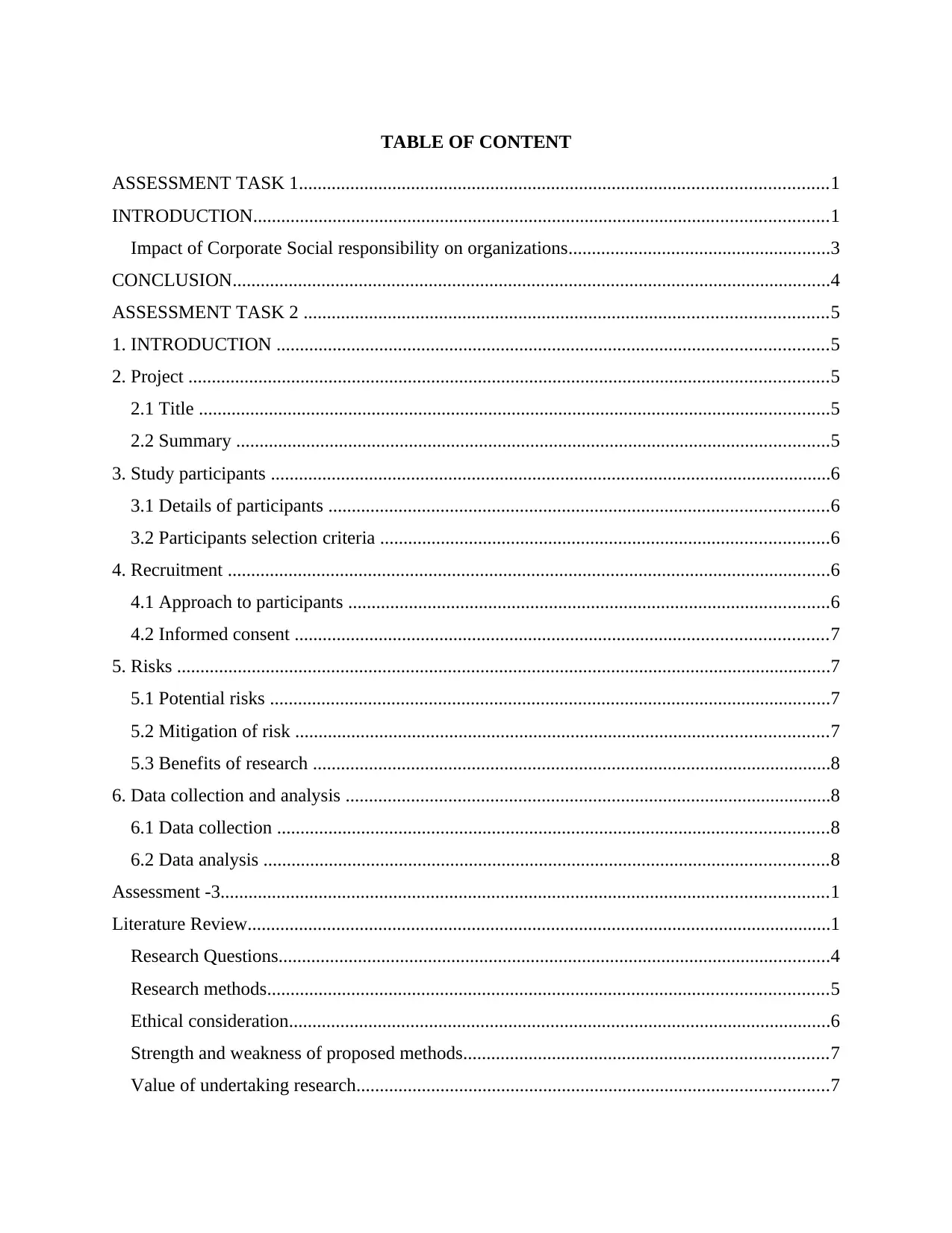
TABLE OF CONTENT
ASSESSMENT TASK 1.................................................................................................................1
INTRODUCTION...........................................................................................................................1
Impact of Corporate Social responsibility on organizations........................................................3
CONCLUSION................................................................................................................................4
ASSESSMENT TASK 2 ................................................................................................................5
1. INTRODUCTION ......................................................................................................................5
2. Project .........................................................................................................................................5
2.1 Title .......................................................................................................................................5
2.2 Summary ...............................................................................................................................5
3. Study participants ........................................................................................................................6
3.1 Details of participants ...........................................................................................................6
3.2 Participants selection criteria ................................................................................................6
4. Recruitment .................................................................................................................................6
4.1 Approach to participants .......................................................................................................6
4.2 Informed consent ..................................................................................................................7
5. Risks ............................................................................................................................................7
5.1 Potential risks ........................................................................................................................7
5.2 Mitigation of risk ..................................................................................................................7
5.3 Benefits of research ...............................................................................................................8
6. Data collection and analysis ........................................................................................................8
6.1 Data collection ......................................................................................................................8
6.2 Data analysis .........................................................................................................................8
Assessment -3..................................................................................................................................1
Literature Review.............................................................................................................................1
Research Questions......................................................................................................................4
Research methods........................................................................................................................5
Ethical consideration....................................................................................................................6
Strength and weakness of proposed methods..............................................................................7
Value of undertaking research.....................................................................................................7
ASSESSMENT TASK 1.................................................................................................................1
INTRODUCTION...........................................................................................................................1
Impact of Corporate Social responsibility on organizations........................................................3
CONCLUSION................................................................................................................................4
ASSESSMENT TASK 2 ................................................................................................................5
1. INTRODUCTION ......................................................................................................................5
2. Project .........................................................................................................................................5
2.1 Title .......................................................................................................................................5
2.2 Summary ...............................................................................................................................5
3. Study participants ........................................................................................................................6
3.1 Details of participants ...........................................................................................................6
3.2 Participants selection criteria ................................................................................................6
4. Recruitment .................................................................................................................................6
4.1 Approach to participants .......................................................................................................6
4.2 Informed consent ..................................................................................................................7
5. Risks ............................................................................................................................................7
5.1 Potential risks ........................................................................................................................7
5.2 Mitigation of risk ..................................................................................................................7
5.3 Benefits of research ...............................................................................................................8
6. Data collection and analysis ........................................................................................................8
6.1 Data collection ......................................................................................................................8
6.2 Data analysis .........................................................................................................................8
Assessment -3..................................................................................................................................1
Literature Review.............................................................................................................................1
Research Questions......................................................................................................................4
Research methods........................................................................................................................5
Ethical consideration....................................................................................................................6
Strength and weakness of proposed methods..............................................................................7
Value of undertaking research.....................................................................................................7
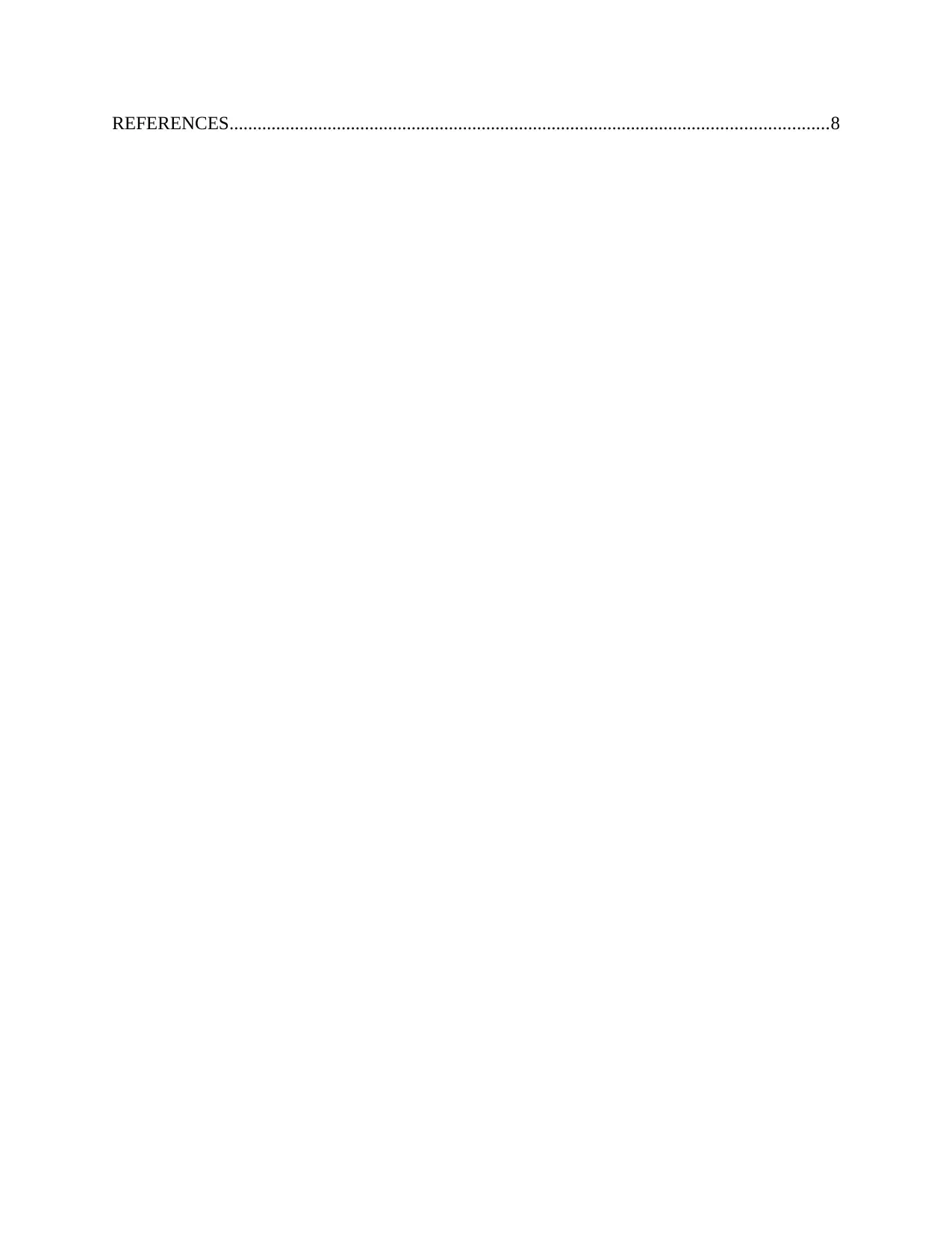
REFERENCES................................................................................................................................8
⊘ This is a preview!⊘
Do you want full access?
Subscribe today to unlock all pages.

Trusted by 1+ million students worldwide
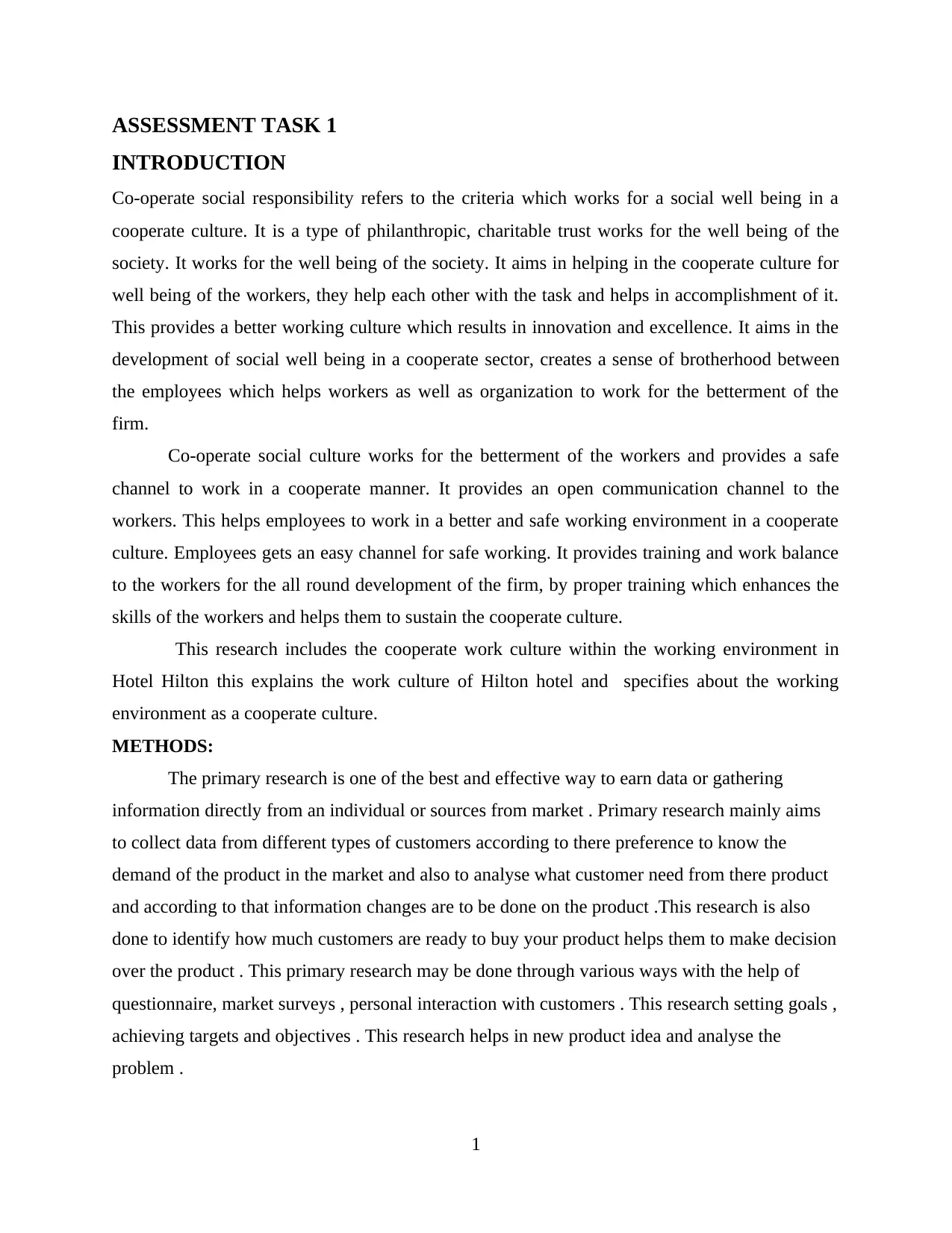
ASSESSMENT TASK 1
INTRODUCTION
Co-operate social responsibility refers to the criteria which works for a social well being in a
cooperate culture. It is a type of philanthropic, charitable trust works for the well being of the
society. It works for the well being of the society. It aims in helping in the cooperate culture for
well being of the workers, they help each other with the task and helps in accomplishment of it.
This provides a better working culture which results in innovation and excellence. It aims in the
development of social well being in a cooperate sector, creates a sense of brotherhood between
the employees which helps workers as well as organization to work for the betterment of the
firm.
Co-operate social culture works for the betterment of the workers and provides a safe
channel to work in a cooperate manner. It provides an open communication channel to the
workers. This helps employees to work in a better and safe working environment in a cooperate
culture. Employees gets an easy channel for safe working. It provides training and work balance
to the workers for the all round development of the firm, by proper training which enhances the
skills of the workers and helps them to sustain the cooperate culture.
This research includes the cooperate work culture within the working environment in
Hotel Hilton this explains the work culture of Hilton hotel and specifies about the working
environment as a cooperate culture.
METHODS:
The primary research is one of the best and effective way to earn data or gathering
information directly from an individual or sources from market . Primary research mainly aims
to collect data from different types of customers according to there preference to know the
demand of the product in the market and also to analyse what customer need from there product
and according to that information changes are to be done on the product .This research is also
done to identify how much customers are ready to buy your product helps them to make decision
over the product . This primary research may be done through various ways with the help of
questionnaire, market surveys , personal interaction with customers . This research setting goals ,
achieving targets and objectives . This research helps in new product idea and analyse the
problem .
1
INTRODUCTION
Co-operate social responsibility refers to the criteria which works for a social well being in a
cooperate culture. It is a type of philanthropic, charitable trust works for the well being of the
society. It works for the well being of the society. It aims in helping in the cooperate culture for
well being of the workers, they help each other with the task and helps in accomplishment of it.
This provides a better working culture which results in innovation and excellence. It aims in the
development of social well being in a cooperate sector, creates a sense of brotherhood between
the employees which helps workers as well as organization to work for the betterment of the
firm.
Co-operate social culture works for the betterment of the workers and provides a safe
channel to work in a cooperate manner. It provides an open communication channel to the
workers. This helps employees to work in a better and safe working environment in a cooperate
culture. Employees gets an easy channel for safe working. It provides training and work balance
to the workers for the all round development of the firm, by proper training which enhances the
skills of the workers and helps them to sustain the cooperate culture.
This research includes the cooperate work culture within the working environment in
Hotel Hilton this explains the work culture of Hilton hotel and specifies about the working
environment as a cooperate culture.
METHODS:
The primary research is one of the best and effective way to earn data or gathering
information directly from an individual or sources from market . Primary research mainly aims
to collect data from different types of customers according to there preference to know the
demand of the product in the market and also to analyse what customer need from there product
and according to that information changes are to be done on the product .This research is also
done to identify how much customers are ready to buy your product helps them to make decision
over the product . This primary research may be done through various ways with the help of
questionnaire, market surveys , personal interaction with customers . This research setting goals ,
achieving targets and objectives . This research helps in new product idea and analyse the
problem .
1
Paraphrase This Document
Need a fresh take? Get an instant paraphrase of this document with our AI Paraphraser
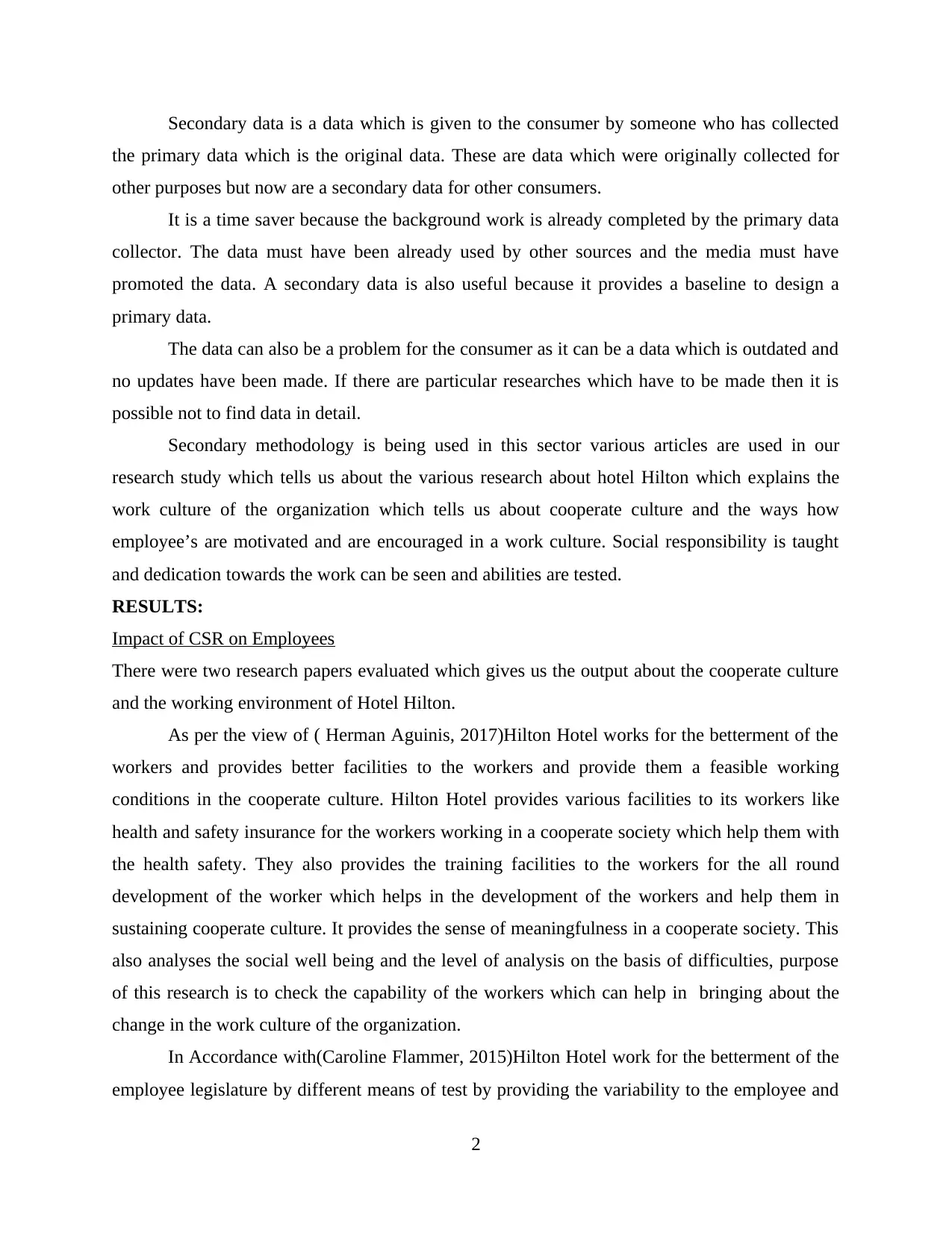
Secondary data is a data which is given to the consumer by someone who has collected
the primary data which is the original data. These are data which were originally collected for
other purposes but now are a secondary data for other consumers.
It is a time saver because the background work is already completed by the primary data
collector. The data must have been already used by other sources and the media must have
promoted the data. A secondary data is also useful because it provides a baseline to design a
primary data.
The data can also be a problem for the consumer as it can be a data which is outdated and
no updates have been made. If there are particular researches which have to be made then it is
possible not to find data in detail.
Secondary methodology is being used in this sector various articles are used in our
research study which tells us about the various research about hotel Hilton which explains the
work culture of the organization which tells us about cooperate culture and the ways how
employee’s are motivated and are encouraged in a work culture. Social responsibility is taught
and dedication towards the work can be seen and abilities are tested.
RESULTS:
Impact of CSR on Employees
There were two research papers evaluated which gives us the output about the cooperate culture
and the working environment of Hotel Hilton.
As per the view of ( Herman Aguinis, 2017)Hilton Hotel works for the betterment of the
workers and provides better facilities to the workers and provide them a feasible working
conditions in the cooperate culture. Hilton Hotel provides various facilities to its workers like
health and safety insurance for the workers working in a cooperate society which help them with
the health safety. They also provides the training facilities to the workers for the all round
development of the worker which helps in the development of the workers and help them in
sustaining cooperate culture. It provides the sense of meaningfulness in a cooperate society. This
also analyses the social well being and the level of analysis on the basis of difficulties, purpose
of this research is to check the capability of the workers which can help in bringing about the
change in the work culture of the organization.
In Accordance with(Caroline Flammer, 2015)Hilton Hotel work for the betterment of the
employee legislature by different means of test by providing the variability to the employee and
2
the primary data which is the original data. These are data which were originally collected for
other purposes but now are a secondary data for other consumers.
It is a time saver because the background work is already completed by the primary data
collector. The data must have been already used by other sources and the media must have
promoted the data. A secondary data is also useful because it provides a baseline to design a
primary data.
The data can also be a problem for the consumer as it can be a data which is outdated and
no updates have been made. If there are particular researches which have to be made then it is
possible not to find data in detail.
Secondary methodology is being used in this sector various articles are used in our
research study which tells us about the various research about hotel Hilton which explains the
work culture of the organization which tells us about cooperate culture and the ways how
employee’s are motivated and are encouraged in a work culture. Social responsibility is taught
and dedication towards the work can be seen and abilities are tested.
RESULTS:
Impact of CSR on Employees
There were two research papers evaluated which gives us the output about the cooperate culture
and the working environment of Hotel Hilton.
As per the view of ( Herman Aguinis, 2017)Hilton Hotel works for the betterment of the
workers and provides better facilities to the workers and provide them a feasible working
conditions in the cooperate culture. Hilton Hotel provides various facilities to its workers like
health and safety insurance for the workers working in a cooperate society which help them with
the health safety. They also provides the training facilities to the workers for the all round
development of the worker which helps in the development of the workers and help them in
sustaining cooperate culture. It provides the sense of meaningfulness in a cooperate society. This
also analyses the social well being and the level of analysis on the basis of difficulties, purpose
of this research is to check the capability of the workers which can help in bringing about the
change in the work culture of the organization.
In Accordance with(Caroline Flammer, 2015)Hilton Hotel work for the betterment of the
employee legislature by different means of test by providing the variability to the employee and
2
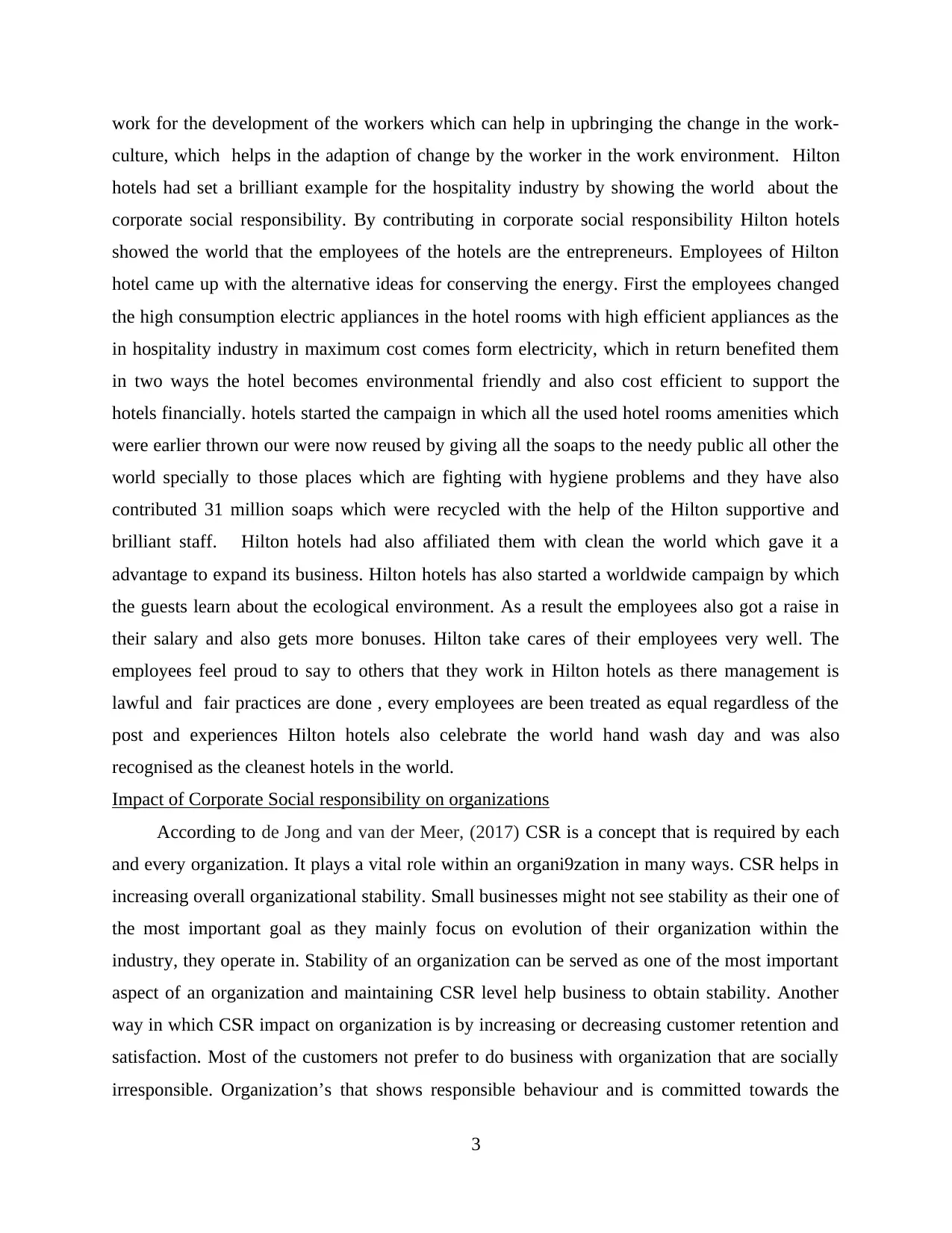
work for the development of the workers which can help in upbringing the change in the work-
culture, which helps in the adaption of change by the worker in the work environment. Hilton
hotels had set a brilliant example for the hospitality industry by showing the world about the
corporate social responsibility. By contributing in corporate social responsibility Hilton hotels
showed the world that the employees of the hotels are the entrepreneurs. Employees of Hilton
hotel came up with the alternative ideas for conserving the energy. First the employees changed
the high consumption electric appliances in the hotel rooms with high efficient appliances as the
in hospitality industry in maximum cost comes form electricity, which in return benefited them
in two ways the hotel becomes environmental friendly and also cost efficient to support the
hotels financially. hotels started the campaign in which all the used hotel rooms amenities which
were earlier thrown our were now reused by giving all the soaps to the needy public all other the
world specially to those places which are fighting with hygiene problems and they have also
contributed 31 million soaps which were recycled with the help of the Hilton supportive and
brilliant staff. Hilton hotels had also affiliated them with clean the world which gave it a
advantage to expand its business. Hilton hotels has also started a worldwide campaign by which
the guests learn about the ecological environment. As a result the employees also got a raise in
their salary and also gets more bonuses. Hilton take cares of their employees very well. The
employees feel proud to say to others that they work in Hilton hotels as there management is
lawful and fair practices are done , every employees are been treated as equal regardless of the
post and experiences Hilton hotels also celebrate the world hand wash day and was also
recognised as the cleanest hotels in the world.
Impact of Corporate Social responsibility on organizations
According to de Jong and van der Meer, (2017) CSR is a concept that is required by each
and every organization. It plays a vital role within an organi9zation in many ways. CSR helps in
increasing overall organizational stability. Small businesses might not see stability as their one of
the most important goal as they mainly focus on evolution of their organization within the
industry, they operate in. Stability of an organization can be served as one of the most important
aspect of an organization and maintaining CSR level help business to obtain stability. Another
way in which CSR impact on organization is by increasing or decreasing customer retention and
satisfaction. Most of the customers not prefer to do business with organization that are socially
irresponsible. Organization’s that shows responsible behaviour and is committed towards the
3
culture, which helps in the adaption of change by the worker in the work environment. Hilton
hotels had set a brilliant example for the hospitality industry by showing the world about the
corporate social responsibility. By contributing in corporate social responsibility Hilton hotels
showed the world that the employees of the hotels are the entrepreneurs. Employees of Hilton
hotel came up with the alternative ideas for conserving the energy. First the employees changed
the high consumption electric appliances in the hotel rooms with high efficient appliances as the
in hospitality industry in maximum cost comes form electricity, which in return benefited them
in two ways the hotel becomes environmental friendly and also cost efficient to support the
hotels financially. hotels started the campaign in which all the used hotel rooms amenities which
were earlier thrown our were now reused by giving all the soaps to the needy public all other the
world specially to those places which are fighting with hygiene problems and they have also
contributed 31 million soaps which were recycled with the help of the Hilton supportive and
brilliant staff. Hilton hotels had also affiliated them with clean the world which gave it a
advantage to expand its business. Hilton hotels has also started a worldwide campaign by which
the guests learn about the ecological environment. As a result the employees also got a raise in
their salary and also gets more bonuses. Hilton take cares of their employees very well. The
employees feel proud to say to others that they work in Hilton hotels as there management is
lawful and fair practices are done , every employees are been treated as equal regardless of the
post and experiences Hilton hotels also celebrate the world hand wash day and was also
recognised as the cleanest hotels in the world.
Impact of Corporate Social responsibility on organizations
According to de Jong and van der Meer, (2017) CSR is a concept that is required by each
and every organization. It plays a vital role within an organi9zation in many ways. CSR helps in
increasing overall organizational stability. Small businesses might not see stability as their one of
the most important goal as they mainly focus on evolution of their organization within the
industry, they operate in. Stability of an organization can be served as one of the most important
aspect of an organization and maintaining CSR level help business to obtain stability. Another
way in which CSR impact on organization is by increasing or decreasing customer retention and
satisfaction. Most of the customers not prefer to do business with organization that are socially
irresponsible. Organization’s that shows responsible behaviour and is committed towards the
3
⊘ This is a preview!⊘
Do you want full access?
Subscribe today to unlock all pages.

Trusted by 1+ million students worldwide
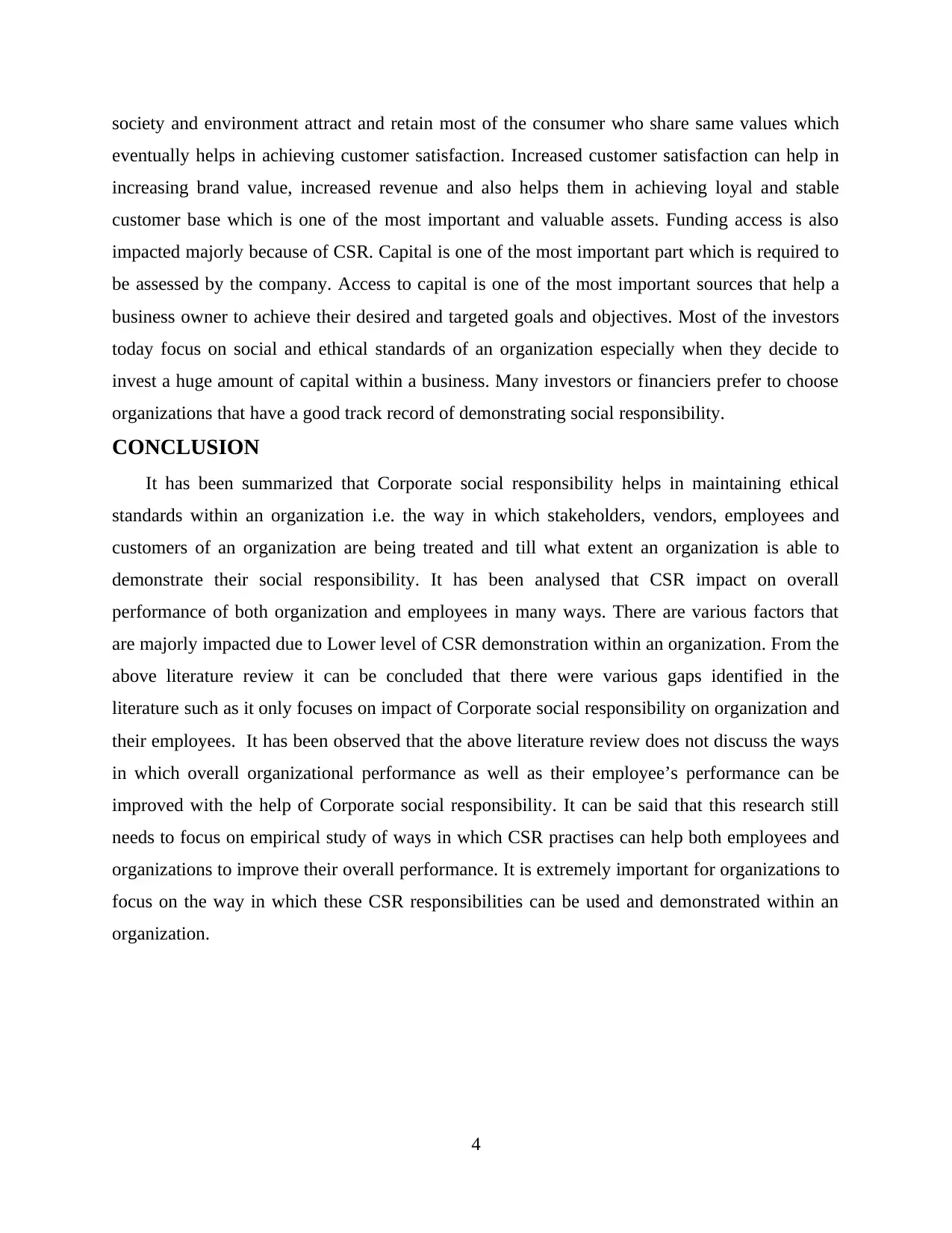
society and environment attract and retain most of the consumer who share same values which
eventually helps in achieving customer satisfaction. Increased customer satisfaction can help in
increasing brand value, increased revenue and also helps them in achieving loyal and stable
customer base which is one of the most important and valuable assets. Funding access is also
impacted majorly because of CSR. Capital is one of the most important part which is required to
be assessed by the company. Access to capital is one of the most important sources that help a
business owner to achieve their desired and targeted goals and objectives. Most of the investors
today focus on social and ethical standards of an organization especially when they decide to
invest a huge amount of capital within a business. Many investors or financiers prefer to choose
organizations that have a good track record of demonstrating social responsibility.
CONCLUSION
It has been summarized that Corporate social responsibility helps in maintaining ethical
standards within an organization i.e. the way in which stakeholders, vendors, employees and
customers of an organization are being treated and till what extent an organization is able to
demonstrate their social responsibility. It has been analysed that CSR impact on overall
performance of both organization and employees in many ways. There are various factors that
are majorly impacted due to Lower level of CSR demonstration within an organization. From the
above literature review it can be concluded that there were various gaps identified in the
literature such as it only focuses on impact of Corporate social responsibility on organization and
their employees. It has been observed that the above literature review does not discuss the ways
in which overall organizational performance as well as their employee’s performance can be
improved with the help of Corporate social responsibility. It can be said that this research still
needs to focus on empirical study of ways in which CSR practises can help both employees and
organizations to improve their overall performance. It is extremely important for organizations to
focus on the way in which these CSR responsibilities can be used and demonstrated within an
organization.
4
eventually helps in achieving customer satisfaction. Increased customer satisfaction can help in
increasing brand value, increased revenue and also helps them in achieving loyal and stable
customer base which is one of the most important and valuable assets. Funding access is also
impacted majorly because of CSR. Capital is one of the most important part which is required to
be assessed by the company. Access to capital is one of the most important sources that help a
business owner to achieve their desired and targeted goals and objectives. Most of the investors
today focus on social and ethical standards of an organization especially when they decide to
invest a huge amount of capital within a business. Many investors or financiers prefer to choose
organizations that have a good track record of demonstrating social responsibility.
CONCLUSION
It has been summarized that Corporate social responsibility helps in maintaining ethical
standards within an organization i.e. the way in which stakeholders, vendors, employees and
customers of an organization are being treated and till what extent an organization is able to
demonstrate their social responsibility. It has been analysed that CSR impact on overall
performance of both organization and employees in many ways. There are various factors that
are majorly impacted due to Lower level of CSR demonstration within an organization. From the
above literature review it can be concluded that there were various gaps identified in the
literature such as it only focuses on impact of Corporate social responsibility on organization and
their employees. It has been observed that the above literature review does not discuss the ways
in which overall organizational performance as well as their employee’s performance can be
improved with the help of Corporate social responsibility. It can be said that this research still
needs to focus on empirical study of ways in which CSR practises can help both employees and
organizations to improve their overall performance. It is extremely important for organizations to
focus on the way in which these CSR responsibilities can be used and demonstrated within an
organization.
4
Paraphrase This Document
Need a fresh take? Get an instant paraphrase of this document with our AI Paraphraser
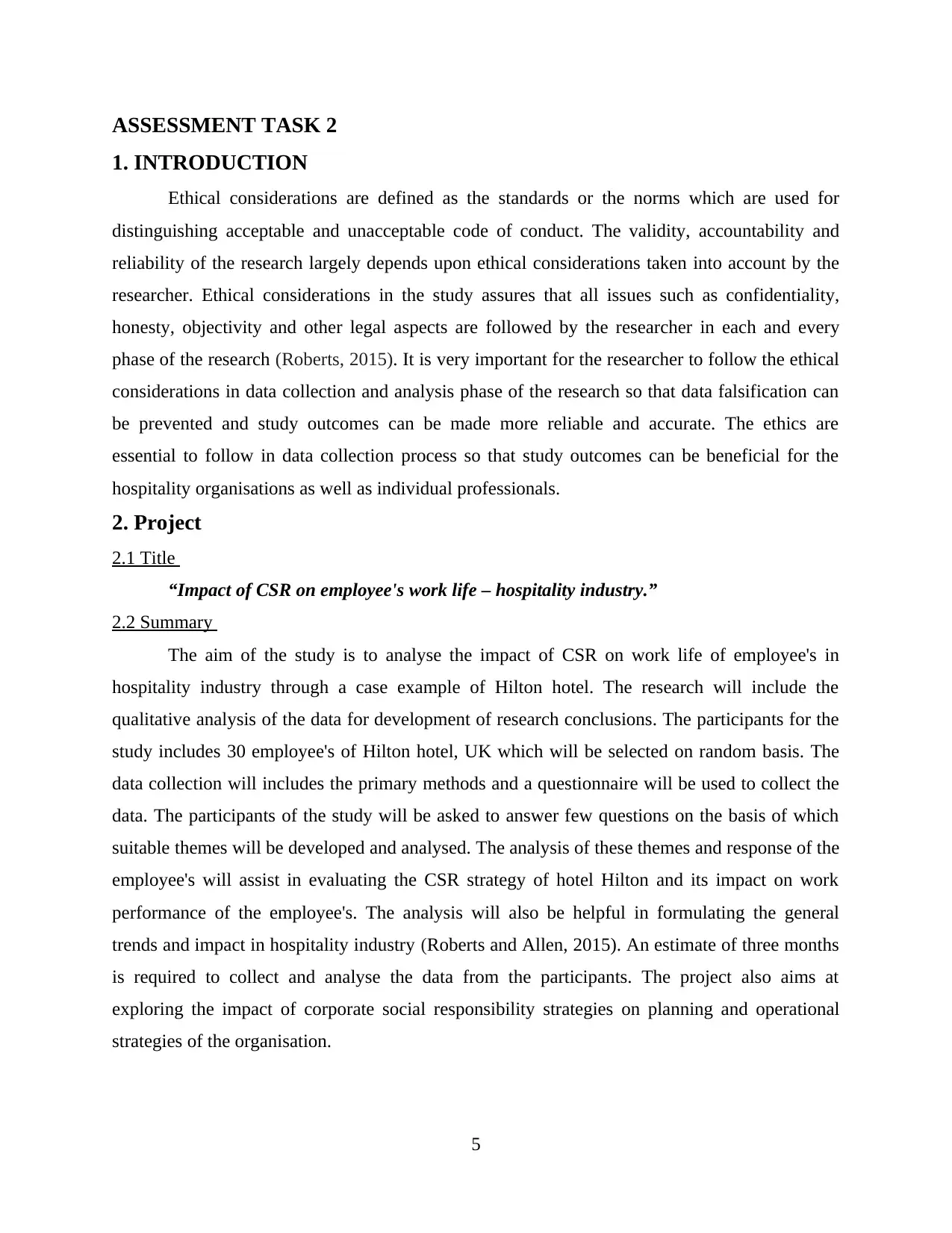
ASSESSMENT TASK 2
1. INTRODUCTION
Ethical considerations are defined as the standards or the norms which are used for
distinguishing acceptable and unacceptable code of conduct. The validity, accountability and
reliability of the research largely depends upon ethical considerations taken into account by the
researcher. Ethical considerations in the study assures that all issues such as confidentiality,
honesty, objectivity and other legal aspects are followed by the researcher in each and every
phase of the research (Roberts, 2015). It is very important for the researcher to follow the ethical
considerations in data collection and analysis phase of the research so that data falsification can
be prevented and study outcomes can be made more reliable and accurate. The ethics are
essential to follow in data collection process so that study outcomes can be beneficial for the
hospitality organisations as well as individual professionals.
2. Project
2.1 Title
“Impact of CSR on employee's work life – hospitality industry.”
2.2 Summary
The aim of the study is to analyse the impact of CSR on work life of employee's in
hospitality industry through a case example of Hilton hotel. The research will include the
qualitative analysis of the data for development of research conclusions. The participants for the
study includes 30 employee's of Hilton hotel, UK which will be selected on random basis. The
data collection will includes the primary methods and a questionnaire will be used to collect the
data. The participants of the study will be asked to answer few questions on the basis of which
suitable themes will be developed and analysed. The analysis of these themes and response of the
employee's will assist in evaluating the CSR strategy of hotel Hilton and its impact on work
performance of the employee's. The analysis will also be helpful in formulating the general
trends and impact in hospitality industry (Roberts and Allen, 2015). An estimate of three months
is required to collect and analyse the data from the participants. The project also aims at
exploring the impact of corporate social responsibility strategies on planning and operational
strategies of the organisation.
5
1. INTRODUCTION
Ethical considerations are defined as the standards or the norms which are used for
distinguishing acceptable and unacceptable code of conduct. The validity, accountability and
reliability of the research largely depends upon ethical considerations taken into account by the
researcher. Ethical considerations in the study assures that all issues such as confidentiality,
honesty, objectivity and other legal aspects are followed by the researcher in each and every
phase of the research (Roberts, 2015). It is very important for the researcher to follow the ethical
considerations in data collection and analysis phase of the research so that data falsification can
be prevented and study outcomes can be made more reliable and accurate. The ethics are
essential to follow in data collection process so that study outcomes can be beneficial for the
hospitality organisations as well as individual professionals.
2. Project
2.1 Title
“Impact of CSR on employee's work life – hospitality industry.”
2.2 Summary
The aim of the study is to analyse the impact of CSR on work life of employee's in
hospitality industry through a case example of Hilton hotel. The research will include the
qualitative analysis of the data for development of research conclusions. The participants for the
study includes 30 employee's of Hilton hotel, UK which will be selected on random basis. The
data collection will includes the primary methods and a questionnaire will be used to collect the
data. The participants of the study will be asked to answer few questions on the basis of which
suitable themes will be developed and analysed. The analysis of these themes and response of the
employee's will assist in evaluating the CSR strategy of hotel Hilton and its impact on work
performance of the employee's. The analysis will also be helpful in formulating the general
trends and impact in hospitality industry (Roberts and Allen, 2015). An estimate of three months
is required to collect and analyse the data from the participants. The project also aims at
exploring the impact of corporate social responsibility strategies on planning and operational
strategies of the organisation.
5
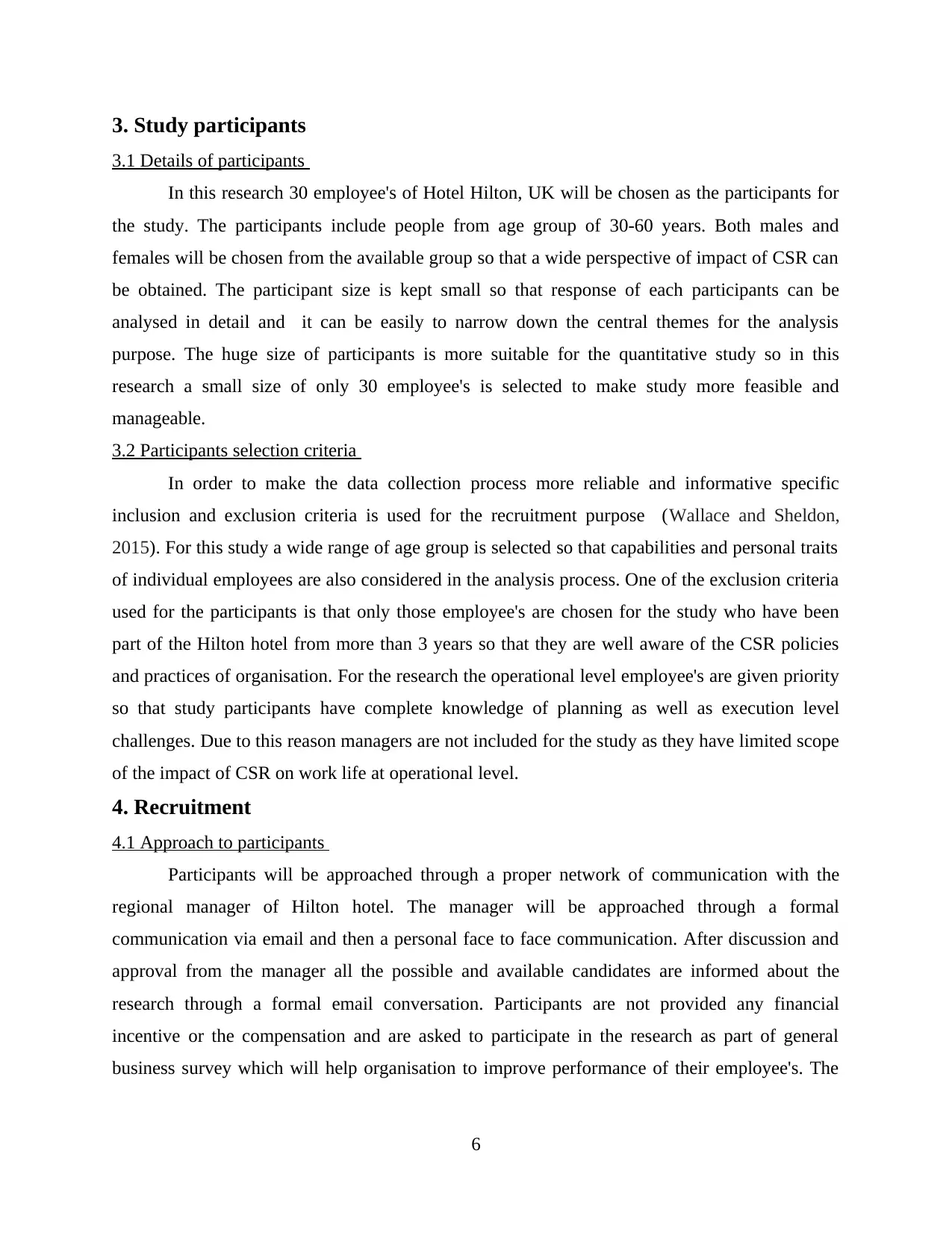
3. Study participants
3.1 Details of participants
In this research 30 employee's of Hotel Hilton, UK will be chosen as the participants for
the study. The participants include people from age group of 30-60 years. Both males and
females will be chosen from the available group so that a wide perspective of impact of CSR can
be obtained. The participant size is kept small so that response of each participants can be
analysed in detail and it can be easily to narrow down the central themes for the analysis
purpose. The huge size of participants is more suitable for the quantitative study so in this
research a small size of only 30 employee's is selected to make study more feasible and
manageable.
3.2 Participants selection criteria
In order to make the data collection process more reliable and informative specific
inclusion and exclusion criteria is used for the recruitment purpose (Wallace and Sheldon,
2015). For this study a wide range of age group is selected so that capabilities and personal traits
of individual employees are also considered in the analysis process. One of the exclusion criteria
used for the participants is that only those employee's are chosen for the study who have been
part of the Hilton hotel from more than 3 years so that they are well aware of the CSR policies
and practices of organisation. For the research the operational level employee's are given priority
so that study participants have complete knowledge of planning as well as execution level
challenges. Due to this reason managers are not included for the study as they have limited scope
of the impact of CSR on work life at operational level.
4. Recruitment
4.1 Approach to participants
Participants will be approached through a proper network of communication with the
regional manager of Hilton hotel. The manager will be approached through a formal
communication via email and then a personal face to face communication. After discussion and
approval from the manager all the possible and available candidates are informed about the
research through a formal email conversation. Participants are not provided any financial
incentive or the compensation and are asked to participate in the research as part of general
business survey which will help organisation to improve performance of their employee's. The
6
3.1 Details of participants
In this research 30 employee's of Hotel Hilton, UK will be chosen as the participants for
the study. The participants include people from age group of 30-60 years. Both males and
females will be chosen from the available group so that a wide perspective of impact of CSR can
be obtained. The participant size is kept small so that response of each participants can be
analysed in detail and it can be easily to narrow down the central themes for the analysis
purpose. The huge size of participants is more suitable for the quantitative study so in this
research a small size of only 30 employee's is selected to make study more feasible and
manageable.
3.2 Participants selection criteria
In order to make the data collection process more reliable and informative specific
inclusion and exclusion criteria is used for the recruitment purpose (Wallace and Sheldon,
2015). For this study a wide range of age group is selected so that capabilities and personal traits
of individual employees are also considered in the analysis process. One of the exclusion criteria
used for the participants is that only those employee's are chosen for the study who have been
part of the Hilton hotel from more than 3 years so that they are well aware of the CSR policies
and practices of organisation. For the research the operational level employee's are given priority
so that study participants have complete knowledge of planning as well as execution level
challenges. Due to this reason managers are not included for the study as they have limited scope
of the impact of CSR on work life at operational level.
4. Recruitment
4.1 Approach to participants
Participants will be approached through a proper network of communication with the
regional manager of Hilton hotel. The manager will be approached through a formal
communication via email and then a personal face to face communication. After discussion and
approval from the manager all the possible and available candidates are informed about the
research through a formal email conversation. Participants are not provided any financial
incentive or the compensation and are asked to participate in the research as part of general
business survey which will help organisation to improve performance of their employee's. The
6
⊘ This is a preview!⊘
Do you want full access?
Subscribe today to unlock all pages.

Trusted by 1+ million students worldwide
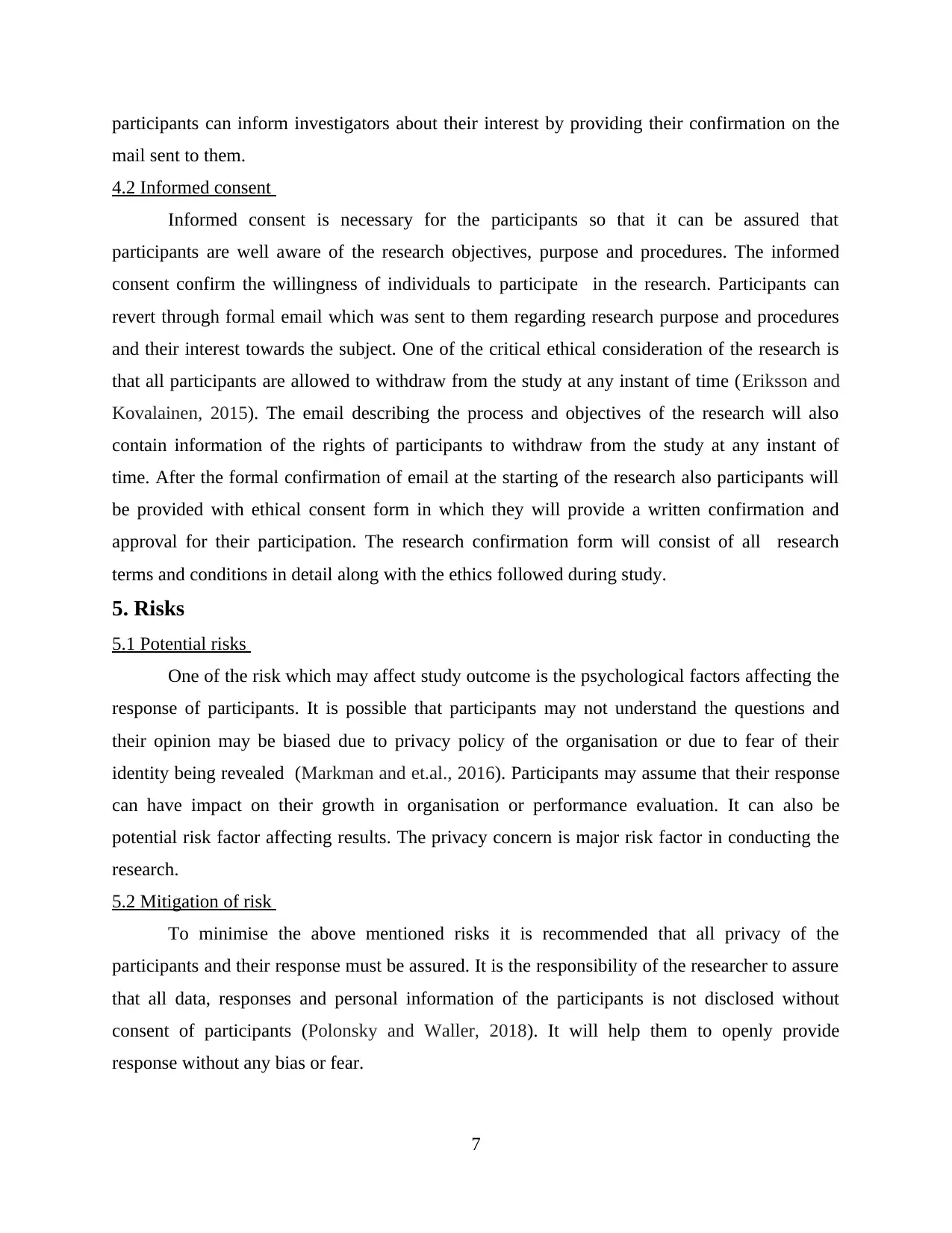
participants can inform investigators about their interest by providing their confirmation on the
mail sent to them.
4.2 Informed consent
Informed consent is necessary for the participants so that it can be assured that
participants are well aware of the research objectives, purpose and procedures. The informed
consent confirm the willingness of individuals to participate in the research. Participants can
revert through formal email which was sent to them regarding research purpose and procedures
and their interest towards the subject. One of the critical ethical consideration of the research is
that all participants are allowed to withdraw from the study at any instant of time (Eriksson and
Kovalainen, 2015). The email describing the process and objectives of the research will also
contain information of the rights of participants to withdraw from the study at any instant of
time. After the formal confirmation of email at the starting of the research also participants will
be provided with ethical consent form in which they will provide a written confirmation and
approval for their participation. The research confirmation form will consist of all research
terms and conditions in detail along with the ethics followed during study.
5. Risks
5.1 Potential risks
One of the risk which may affect study outcome is the psychological factors affecting the
response of participants. It is possible that participants may not understand the questions and
their opinion may be biased due to privacy policy of the organisation or due to fear of their
identity being revealed (Markman and et.al., 2016). Participants may assume that their response
can have impact on their growth in organisation or performance evaluation. It can also be
potential risk factor affecting results. The privacy concern is major risk factor in conducting the
research.
5.2 Mitigation of risk
To minimise the above mentioned risks it is recommended that all privacy of the
participants and their response must be assured. It is the responsibility of the researcher to assure
that all data, responses and personal information of the participants is not disclosed without
consent of participants (Polonsky and Waller, 2018). It will help them to openly provide
response without any bias or fear.
7
mail sent to them.
4.2 Informed consent
Informed consent is necessary for the participants so that it can be assured that
participants are well aware of the research objectives, purpose and procedures. The informed
consent confirm the willingness of individuals to participate in the research. Participants can
revert through formal email which was sent to them regarding research purpose and procedures
and their interest towards the subject. One of the critical ethical consideration of the research is
that all participants are allowed to withdraw from the study at any instant of time (Eriksson and
Kovalainen, 2015). The email describing the process and objectives of the research will also
contain information of the rights of participants to withdraw from the study at any instant of
time. After the formal confirmation of email at the starting of the research also participants will
be provided with ethical consent form in which they will provide a written confirmation and
approval for their participation. The research confirmation form will consist of all research
terms and conditions in detail along with the ethics followed during study.
5. Risks
5.1 Potential risks
One of the risk which may affect study outcome is the psychological factors affecting the
response of participants. It is possible that participants may not understand the questions and
their opinion may be biased due to privacy policy of the organisation or due to fear of their
identity being revealed (Markman and et.al., 2016). Participants may assume that their response
can have impact on their growth in organisation or performance evaluation. It can also be
potential risk factor affecting results. The privacy concern is major risk factor in conducting the
research.
5.2 Mitigation of risk
To minimise the above mentioned risks it is recommended that all privacy of the
participants and their response must be assured. It is the responsibility of the researcher to assure
that all data, responses and personal information of the participants is not disclosed without
consent of participants (Polonsky and Waller, 2018). It will help them to openly provide
response without any bias or fear.
7
Paraphrase This Document
Need a fresh take? Get an instant paraphrase of this document with our AI Paraphraser
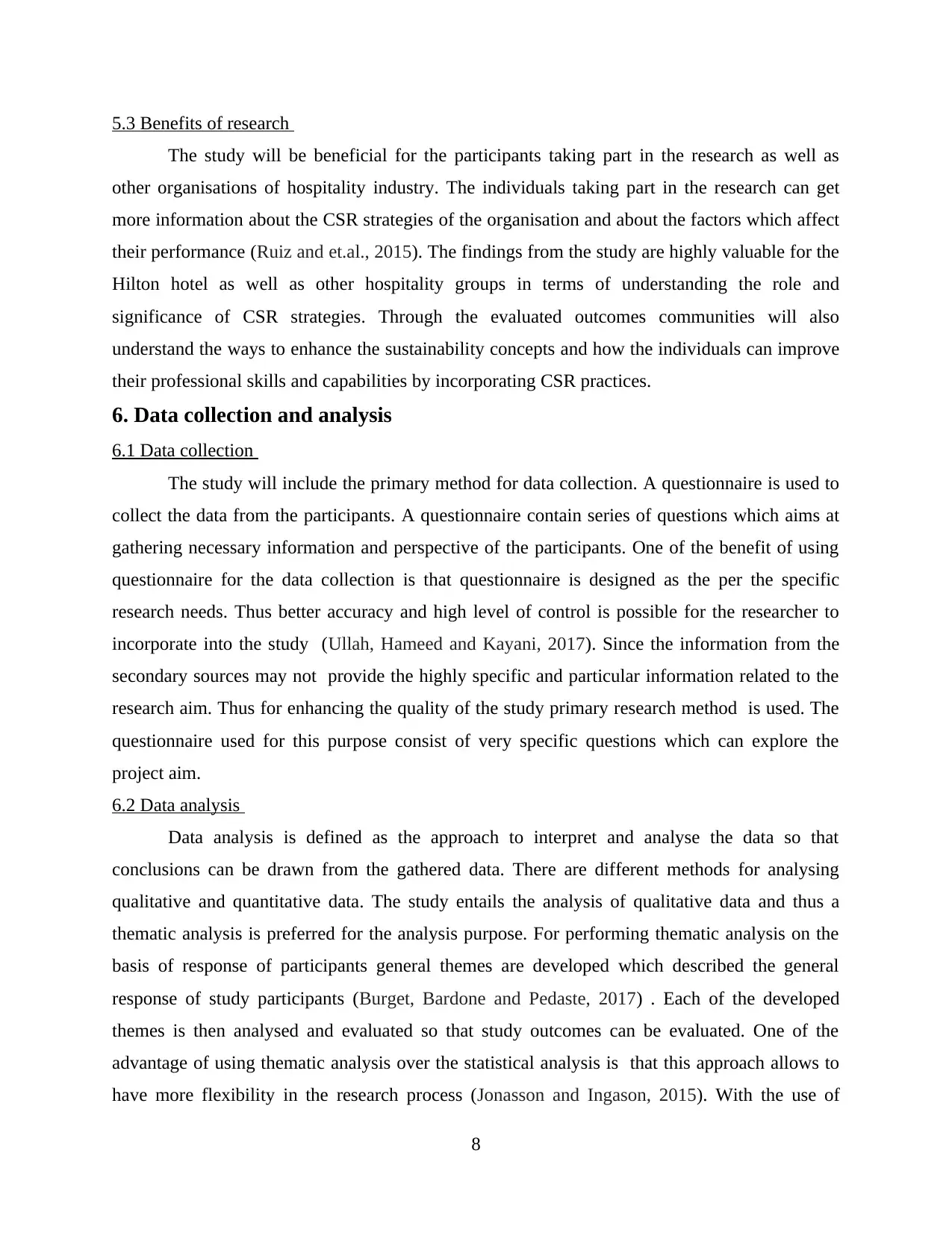
5.3 Benefits of research
The study will be beneficial for the participants taking part in the research as well as
other organisations of hospitality industry. The individuals taking part in the research can get
more information about the CSR strategies of the organisation and about the factors which affect
their performance (Ruiz and et.al., 2015). The findings from the study are highly valuable for the
Hilton hotel as well as other hospitality groups in terms of understanding the role and
significance of CSR strategies. Through the evaluated outcomes communities will also
understand the ways to enhance the sustainability concepts and how the individuals can improve
their professional skills and capabilities by incorporating CSR practices.
6. Data collection and analysis
6.1 Data collection
The study will include the primary method for data collection. A questionnaire is used to
collect the data from the participants. A questionnaire contain series of questions which aims at
gathering necessary information and perspective of the participants. One of the benefit of using
questionnaire for the data collection is that questionnaire is designed as the per the specific
research needs. Thus better accuracy and high level of control is possible for the researcher to
incorporate into the study (Ullah, Hameed and Kayani, 2017). Since the information from the
secondary sources may not provide the highly specific and particular information related to the
research aim. Thus for enhancing the quality of the study primary research method is used. The
questionnaire used for this purpose consist of very specific questions which can explore the
project aim.
6.2 Data analysis
Data analysis is defined as the approach to interpret and analyse the data so that
conclusions can be drawn from the gathered data. There are different methods for analysing
qualitative and quantitative data. The study entails the analysis of qualitative data and thus a
thematic analysis is preferred for the analysis purpose. For performing thematic analysis on the
basis of response of participants general themes are developed which described the general
response of study participants (Burget, Bardone and Pedaste, 2017) . Each of the developed
themes is then analysed and evaluated so that study outcomes can be evaluated. One of the
advantage of using thematic analysis over the statistical analysis is that this approach allows to
have more flexibility in the research process (Jonasson and Ingason, 2015). With the use of
8
The study will be beneficial for the participants taking part in the research as well as
other organisations of hospitality industry. The individuals taking part in the research can get
more information about the CSR strategies of the organisation and about the factors which affect
their performance (Ruiz and et.al., 2015). The findings from the study are highly valuable for the
Hilton hotel as well as other hospitality groups in terms of understanding the role and
significance of CSR strategies. Through the evaluated outcomes communities will also
understand the ways to enhance the sustainability concepts and how the individuals can improve
their professional skills and capabilities by incorporating CSR practices.
6. Data collection and analysis
6.1 Data collection
The study will include the primary method for data collection. A questionnaire is used to
collect the data from the participants. A questionnaire contain series of questions which aims at
gathering necessary information and perspective of the participants. One of the benefit of using
questionnaire for the data collection is that questionnaire is designed as the per the specific
research needs. Thus better accuracy and high level of control is possible for the researcher to
incorporate into the study (Ullah, Hameed and Kayani, 2017). Since the information from the
secondary sources may not provide the highly specific and particular information related to the
research aim. Thus for enhancing the quality of the study primary research method is used. The
questionnaire used for this purpose consist of very specific questions which can explore the
project aim.
6.2 Data analysis
Data analysis is defined as the approach to interpret and analyse the data so that
conclusions can be drawn from the gathered data. There are different methods for analysing
qualitative and quantitative data. The study entails the analysis of qualitative data and thus a
thematic analysis is preferred for the analysis purpose. For performing thematic analysis on the
basis of response of participants general themes are developed which described the general
response of study participants (Burget, Bardone and Pedaste, 2017) . Each of the developed
themes is then analysed and evaluated so that study outcomes can be evaluated. One of the
advantage of using thematic analysis over the statistical analysis is that this approach allows to
have more flexibility in the research process (Jonasson and Ingason, 2015). With the use of
8
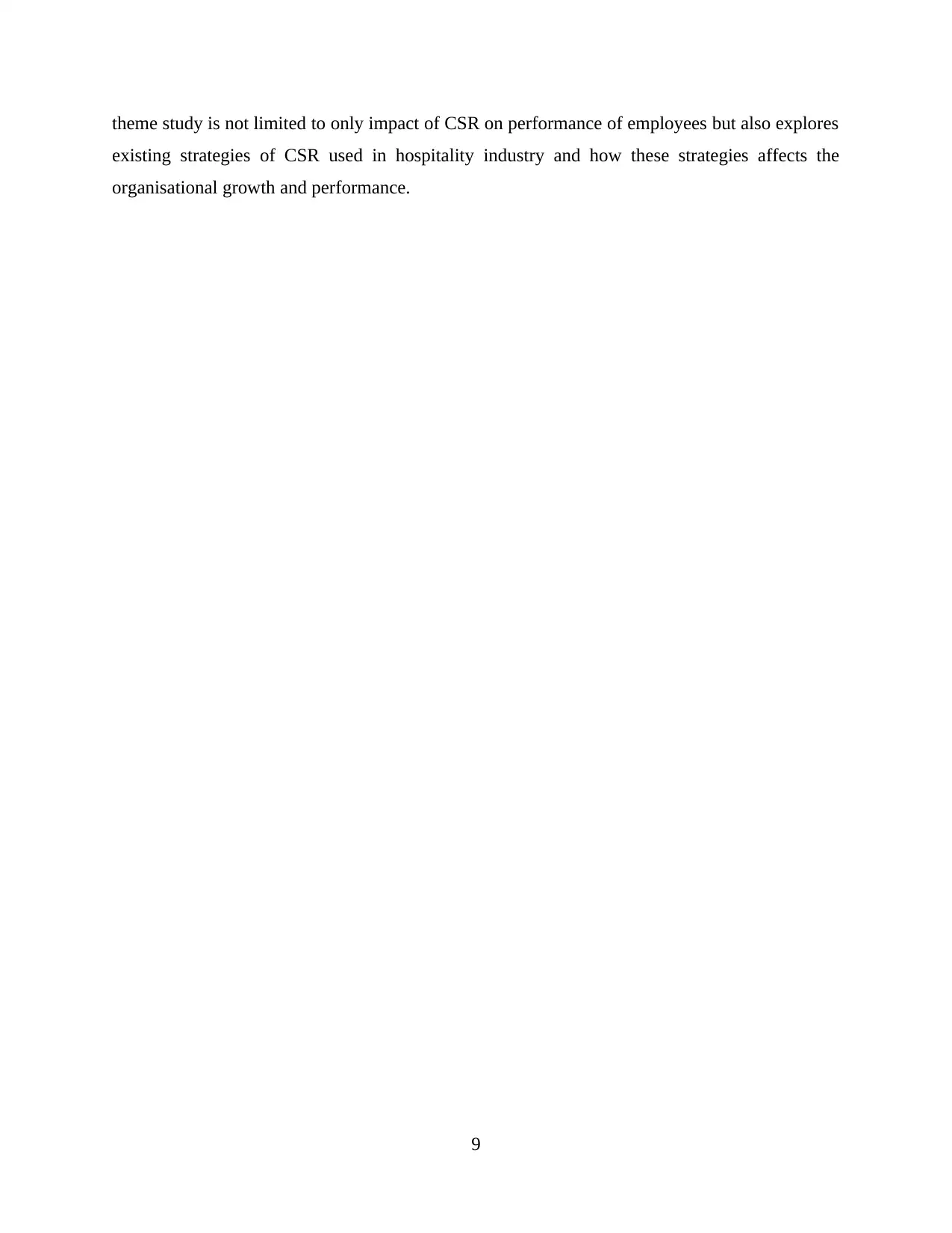
theme study is not limited to only impact of CSR on performance of employees but also explores
existing strategies of CSR used in hospitality industry and how these strategies affects the
organisational growth and performance.
9
existing strategies of CSR used in hospitality industry and how these strategies affects the
organisational growth and performance.
9
⊘ This is a preview!⊘
Do you want full access?
Subscribe today to unlock all pages.

Trusted by 1+ million students worldwide
1 out of 23
Related Documents
Your All-in-One AI-Powered Toolkit for Academic Success.
+13062052269
info@desklib.com
Available 24*7 on WhatsApp / Email
![[object Object]](/_next/static/media/star-bottom.7253800d.svg)
Unlock your academic potential
Copyright © 2020–2025 A2Z Services. All Rights Reserved. Developed and managed by ZUCOL.




